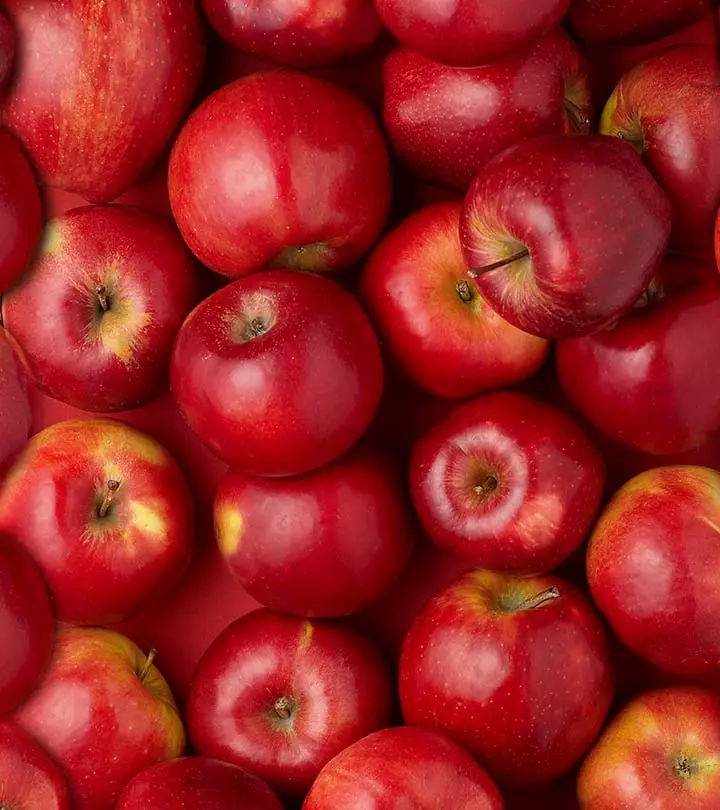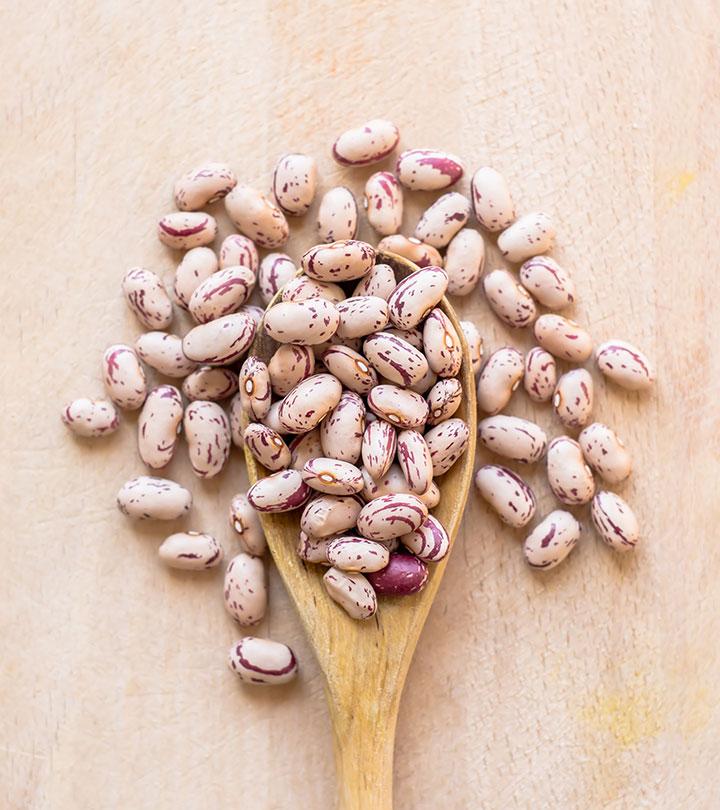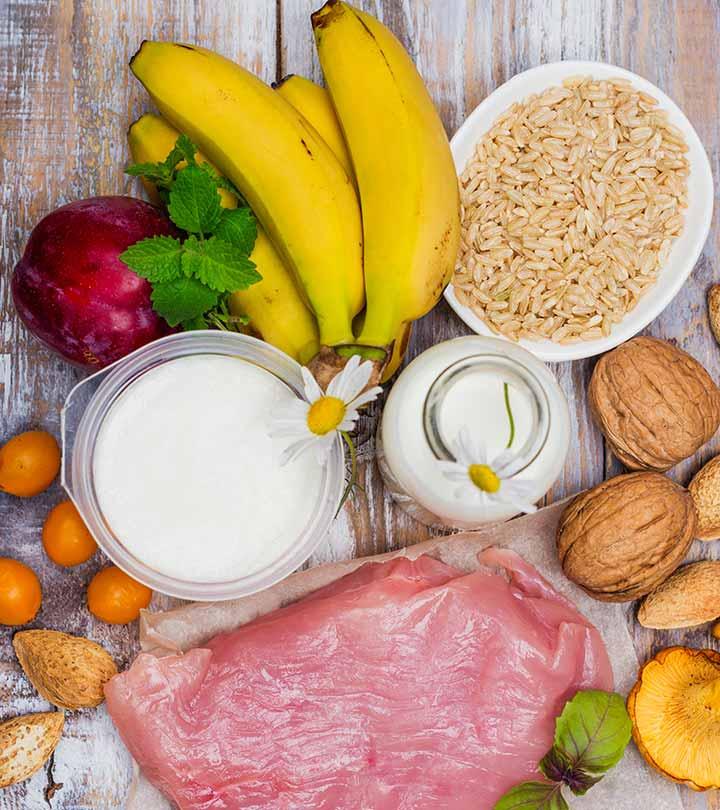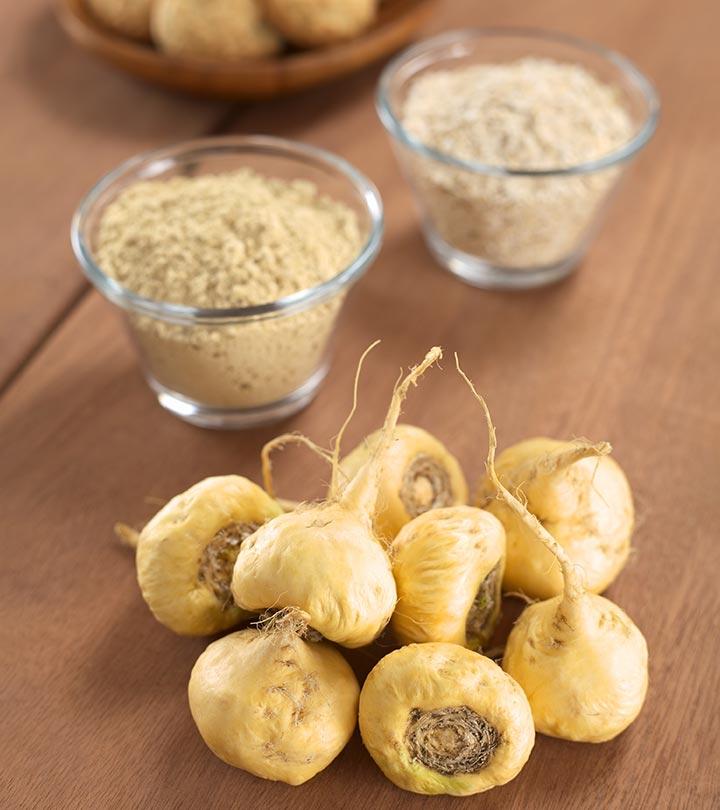12 Amazing Benefits Of Orange For A Healthy Life
Because consuming some slices of this healthy citrus fruit can do wonders for your body!

Image: Shutterstock
There are many health benefits of oranges. They are packed with nutrients and vitamins and contain beta-carotene, potassium, magnesium, and dietary fiber. Furthermore, they are alkalizing and detoxifying, making them good for your health.
The humble orange benefits your health in several ways. First, it helps you lose weight and boost your immunity. You could benefit from its antiviral, anti-inflammatory, antibacterial, and antifungal properties. Orange juice has anti-inflammatory properties and may help treat chronic diseases (1).
This article discusses the health benefits of oranges, recommended dosage, nutritional profile, and any potential side effects. Scroll down to read more on how this gorgeous orange fruit benefits your health.
 Know Your Ingredient: Orange
Know Your Ingredient: OrangeWhat Is It?
A fruit of various citrus species in the family Rutaceae.
What Are Its Benefits?
May aid in weight loss, boost immunity, and improve heart health.
Who Can Consume It?
Anyone can consume it except for people who have high potassium levels
How Often?
You can consume in moderation daily for sound health.
Caution
Avoid consuming it if you have gastroesophageal reflux disease (GERD).
In This Article
What Are The Health Benefits Of Oranges?
Orange is a highly nutritious citrus fruit that contains a variety of phytochemicals. But most often we consume it without knowing its nutritional value and benefits. So, what are oranges good for? Are oranges healthy for all? Let us find that out here:
1. May Aid Weight Loss
Reports suggest that the fiber in oranges may promote satiety, which may contribute to weight loss. Whole oranges were found to promote satiety better than orange juice (which is devoid of fiber) (2).
The fiber in oranges can keep you full, and you end up eating less. You can substitute this low-calorie fruit for desserts, which will not leave you craving for sweets.
 Did You Know?
Did You Know?Steve, a YouTuber, shares in one of his vlogs his experience of eating only different types of oranges for 31 days for a full-body detox: “The craving intensity isn’t as strong, I know I have detoxed a lot out (i).” He adds that the oranges need to be of good quality and you must consume the appropriate amount. However, do note that this is an extreme detox, and it is always best to consult a dietitian before trying it out.
2. May Delay Skin Aging
Oranges, like most other citrus fruits, may help prevent UV-induced skin damage. and help as a skin protecting agent. In mouse studies, the ingestion of unripe citrus extracts could decrease wrinkle depth and slow down collagen degradation, thus, promoting anti-aging properties (3).
Oranges contain organic acids, vitamins, minerals, vitamin C, and flavonoids. These could play a role in skin health (3).
Some anecdotal evidence suggests that the topical application of oranges may also nourish the skin. Their water content may also hydrate the skin and accelerate collagen production. However, more research is needed to establish this.
3. May Regulate Blood Pressure Levels
Oranges (and their juice) are rich in potassium, which helps regulate blood pressure. Some studies also suggest that commercial orange juice may have a significant effect on blood pressure and other associated ailments (4).
4. May Lower Cholesterol Levels
Long-term intake of orange juice was associated with lower cholesterol levels in men and women. The juice could reduce total cholesterol levels and the levels of bad cholesterol (5).
Oranges are rich in fiber (pectin). Rat studies show that this fiber can help lower cholesterol levels in the liver and serum (6).
Fiber may also prevent your digestive tract from absorbing cholesterol. It also is believed that in addition to fiber, vitamin C, potassium, and flavonoids in the fruit may also help lower cholesterol.
5. May Promote Heart Health
Studies show that foods rich in vitamin C, like oranges, can help prevent heart disease by keeping cholesterol levels low (7).
The vitamin C in the fruit also keeps blood from clotting. This prevents thrombosis (local blood clotting) and reduces the risk of a heart attack (7).
The potassium in oranges, as discussed, can lower blood pressure and reduce the risk of cardiovascular diseases (4).
6. May Aid Diabetes Treatment
In a Nigerian study, oranges, along with other fruits, were considered safe to be eaten by those with diabetes. This had to do with the healthy glycemic response the fruit had in the body (8).
The pulpiness of the fruit serves as a great source of fiber. Fiber helps in slowing down the absorption of sugar and improving the blood sugar levels (9).
However, there is no research if orange fiber, in particular, helps lower blood glucose levels. Some believe the moderate glycemic index of oranges may help in diabetes, but this also has not been proven.
To completely absorb the fiber, avoid extracted juices, and go for the whole fruits (10).
7. May Prevent Kidney Stones
Citrate deficiency in urine can cause kidney stones. Oranges (and their juice) can help increase citrate levels in your urine, reducing the risk of kidney stones (11).
Oranges (and the juice) also contain calcium that may reduce the risk of stones (11).
8. May Help Treat Anemia
The vitamin C in oranges may promote iron absorption. Iron cannot be fully absorbed in the body without the help of vitamin C (a nutrient that oranges are loaded with) (12). Snacking on at least one orange every day may help in the treatment and also promote electrolyte balance.
Oranges contain folic acid as well. Some research shows that this nutrient may help prevent megaloblastic anemia, a blood disorder that causes fatigue (13).
9. May Help Boost Immunity
Oranges are rich in vitamin C. Some research states that this nutrient can help as an immunity booster (14). Though there is no direct research stating oranges can promote immunity, its vitamin C content could help.
The fruits contain many other essential nutrients like folate and copper, which may also promote immune system health.
10. May Reduce The Risk Of Colon Cancer
Rat studies show that orange juice may help inhibit colon cancer. The fruit (and its juice) contain hesperidin, which is a flavonoid with chemopreventive potential (15).
The fiber in oranges may help reduce the risk of colon cancer. Oranges also contain other important chemopreventive agents that help in this anti-cancer regard (16).
However, some research states that a high intake of orange/yellow fruits may increase the risk of colorectal cancer in men. The mechanism behind this is yet to be studied (17).
The fiber in oranges also helps treat constipation and aids digestion. It is believed that the less fructose in oranges makes them less likely to cause gas. Research is limited here, though.
11. May Promote Eye Health
You must have heard how orange-colored fruits and vegetables promote eye health and protect vision. Eating oranges can offer significant eye benefits as the flavonoids in them help boost vision health. Studies showed that participants who consumed oranges were found to have a reduced risk of age-related macular degeneration (18).
Additional studies are required to validate these findings.
12. May Help Treat Polycystic Ovary Syndrome
You should follow a diet that contains low glycemic indexi These foods contain slow-digesting carbohydrates that lead to slower and lower increases in blood glucose and insulin levels. foods to combat PCOSi A hormonal disorder that results in enlarged ovaries and tiny cysts on their outer margins, which cause irregular menstruation or acne. . Orange has a low glycemic index and is suitable for those with PCOS. Oranges also improve insulin resistance, which is thought to be the origin of PCOS (19).
These are some of the important benefits of eating oranges.
Oranges are quite popular. They taste refreshing, but more importantly, they contain important antioxidants that promote human health. Though oranges are common, they are available in different types that we may not be aware of.
What Are The Different Types Of Oranges?
The most common types of oranges are the Washington navel, blood oranges, and valencia.
Oranges are likely to have originated in southern China, northeastern India, and other parts of southeastern Asia. They have since been hybridized, re-hybridized, and altered so much that there are hundreds of orange varieties found around the world today.
 Trivia
TriviaWhile we have understood the benefits of eating oranges everyday, it is important to understand the fruit’s nutritional values and its various applications that make it so potent.
What Is The Nutritional Profile Of Oranges?
| Calorie Information | ||
|---|---|---|
| Amounts Per Selected Serving | %DV | |
| Calories | 84.6(354 kJ) | 4% |
| From Carbohydrate | 77.1(323 kJ) | |
| From Fat | 1.8(7.5 kJ) | |
| From Protein | 5.7(23.9 kJ) | |
| From Alcohol | 0.0(0.0 kJ) | |
| Protein & Amino Acids | ||
| Amounts Per Selected Serving | %DV | |
| Protein | 1.7g | 3% |
| Carbohydrates | ||
| Amounts Per Selected Serving | %DV | |
| Total Carbohydrate | 21.1g | 7% |
| Dietary Fiber | 4.3g | 17% |
| Starch | 0.0g | |
| Sugars | 16.8g | |
| Vitamins | ||
| Amounts Per Selected Serving | %DV | |
| Vitamin A | 405IU | 8% |
| Vitamin C | 95.8mg | 160% |
| Vitamin D | ~ | ~ |
| Vitamin E (Alpha Tocopherol) | 0.3mg | 2% |
| Vitamin K | 0.0mcg | 0% |
| Thiamin | 0.2mg | 10% |
| Riboflavin | 0.1mg | 4% |
| Niacin | 0.5mg | 3% |
| Vitamin B6 | 0.1mg | 5% |
| Folate | 54.0mcg | 14% |
| Vitamin B12 | 0.0mcg | 0% |
| Pantothenic Acid | 0.5mg | 5% |
| Choline | 15.1mg | |
| Betaine | ~ | |
| Minerals | ||
| Amounts Per Selected Serving | %DV | |
| Calcium | 72.0mg | 7% |
| Iron | 0.2mg | 1% |
| Magnesium | 18.0mg | 4% |
| Phosphorus | 25.2mg | 3% |
| Potassium | 326mg | 9% |
| Sodium | 0.0mg | 0% |
| Zinc | 0.1mg | 1% |
| Copper | 0.1mg | 4% |
| Manganese | 0.0mg | 2% |
| Selenium | 0.9mcg | 1% |
| Fluoride | ~ | |
*Values sourced from U.S. Department of Agriculture, Oranges, raw
In pre-historic times, Europeans recognized the medicinal properties of oranges and stocked them on long sea voyages to prevent scurvy. These citrus powerhouses are important sources of vitamin C and folate. Oranges also contain significant antioxidants, such as beta-carotene and other flavonoids.
But does this mean you can eat as many oranges as you want? Well, maybe not. Excess intake of oranges may cause certain undesirable effects.
What Are The Side Effects Of Eating Too Many Oranges?
Oranges are great for you, but only when consumed in moderation.
As they are highly acidic, oranges may lead to heartburn if consumed in excess. They can also aggravate symptoms of GERD (gastroesophageal reflux disease)i A chronic condition that develops when bile or stomach acid enters the esophagus and irritates the cell walls. (20).
Due to their acidic content, eating too many oranges can also lead to indigestion (21).
Consuming too many oranges may also cause abdominal pain. One study states the case of an individual who had developed severe abdominal pain after consuming oranges. Its high fiber content could be the reason (22).
So, are oranges good for you every day? How many can we eat in a day? Some anecdotal evidence states that eating too many oranges may also lead to diarrhea. However, we need more research to prove this statement.
Hence, it is important you keep a check on the number of oranges you are consuming in a day.
How Many Oranges Can You Eat In A Day?
There is no concrete research on this – but looking at the high vitamin C levels and the abundance of other beneficial phytochemicals, you can consume one to two oranges a day.
Apart from consuming oranges fresh, you can use them in savory dishes and desserts to add a sweet and tangy flavor. Check out the next section for an easy recipe you can try at home.
Savoury Orange Recipe To Try
Orange Cake
Ingredients
- 1 cup of granulated sugar
- 2 ½ cups of all-purpose flour
- ¾ cup of fresh orange juice
- 1 cup of vegetable oil
- 2 tablespoons of orange zest
- 1 tablespoon of vanilla extract
- ¾ teaspoon of baking powder
- ¼ teaspoon of salt
- 3 large eggs
Method
1. Preheat the oven to 350°F.
2. Whisk the flour, baking powder, and salt in a large bowl.
3. Combine sugar, orange zest, oil, eggs, orange juice, and vanilla, in another bowl. Whisk until the ingredients are combined.
4. Pour the batter into the cake pan.
5. Bake for 70 minutes and prick the cake with a wooden toothpick to check for moistness.
6. Let the cake cool for 15 minutes before cutting it.
7. Serve and enjoy!
Infographic: Everything You Need To Know About Oranges
Oranges are the powerhouses of nutrients, especially vitamin C and fiber. This vitamin-rich fruit may also help with metabolic health. Consuming just one orange can give you enough vitamin C required for a day. But, which is better to consume — a whole fruit or commercially available orange juice? Is there a difference in their nutritional values? When to consume sweet or bitter oranges? Keep scrolling to find the answers in the following infographic. Illustration: StyleCraze Design Team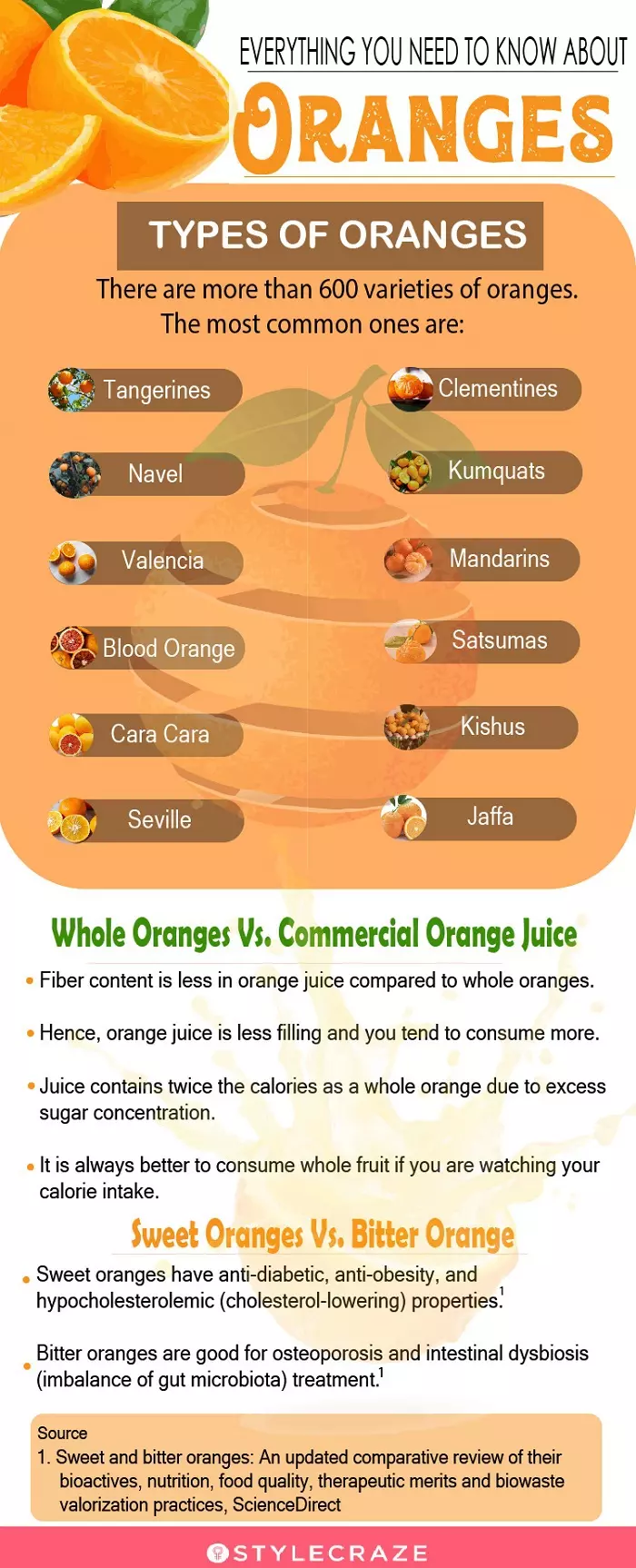
The benefits of oranges can be attributed to their nutrients. This nutrient-dense food can promote weight loss, delay signs of aging, and promote heart and eye health. Oranges also boost immunity, reduce cancer risk, aid in treating diabetes, anemia, and polycystic ovary syndrome, and help reduce kidney stone risk. However, overconsumption may aggravate symptoms of GERD and lead to indigestion, abdominal pain, and diarrhea. Hence, caution is advised. But consuming oranges in moderate amounts offer many benefits.
Frequently Asked Questions
How long do oranges last?
Soon after an orange is picked from the tree, it will last for about three weeks at room temperature.
How to store oranges?
Store whole oranges in the refrigerator to extend their shelf life for up to two months. Canning oranges or making jams and jellies are the other ways you can preserve the fruits (23).
What is the difference between mandarin and orange tangerine?
Tangerines are smaller and sweeter than oranges while larger than mandarins. Tangerine has a reddish-orange skin that distinguishes it from the lighter-skinned mandarin and the brighter-skinned orange.
Can you freeze oranges?
Yes. Though frozen fruit is not as good as the fresh variety, oranges aren’t too bad when frozen and thawed. Freezing is one of the most practical ways to preserve fruits at home. The extreme cold retards the growth of microorganisms and slows down the process of rotting. Frozen oranges will continue to retain most of their nutrition and flavor. Freeze them whole, in pieces, or packed in syrup.
What happens if you eat oranges every day?
Eating an orange or two every day is a wonderful way of providing your body with the goodness of important antioxidants and phytochemicals. You will enjoy all of the benefits discussed in this article when you make oranges a part of your regular diet.
Are oranges good for pregnant women?
Oranges are a nourishing addition to the diets of pregnant women. However, orange juices available in tetra packs are not recommended as they may contain preservatives that may be harmful during this period.
Can you eat oranges while breastfeeding?
Your body needs more vitamin C during breastfeeding as compared to pregnancy. Oranges are excellent sources of vitamin C and work as wonderful energy boosters. They also help absorb more iron from food. Hence, you might want to eat oranges or drink orange juice while breastfeeding.
However, you need to exercise constraint as oranges contain a high amount of citrus and acid. If your baby shows any symptoms after you start consuming oranges, please stop orange intake. Reintroduce after a few days to check for any side effects. Make sure to consult your doctor.
Can you eat oranges on an empty stomach?
No. Oranges are generally acidic, and eating them (or any acidic fruit) on an empty stomach may trigger symptoms of acid reflux.
Key Takeaways
- Whole oranges have a high fiber content that may promote satiety.
- Oranges prevent our skin from UV damage as they contain organic acids, vitamins, and minerals.
- Orange juice may reduce cholesterol levels and promote heart health as it is rich in fiber and vitamin C.
- Excess consumption of oranges may lead to heartburn and indigestion due to their acidic nature.

Image: Stable Diffusion/StyleCraze Design Team
“Oranges are packed with vitamins and minerals that can benefit your health. Learn how oranges can help you stay healthy and fit. Check this video to know how!”
Personal Experience: Source
StyleCraze's articles are interwoven with authentic personal narratives that provide depth and resonance to our content. Below are the sources of the personal accounts referenced in this article.
i. I Only Ate Oranges For One Monthhttps://www.youtube.com/watch?v=0qYDR-VY7Bk
References
Articles on StyleCraze are backed by verified information from peer-reviewed and academic research papers, reputed organizations, research institutions, and medical associations to ensure accuracy and relevance. Read our editorial policy to learn more.
- Anti-inflammatory properties of orange juice: possible favorable molecular and metabolic effects, Plant Foods for Human Nutrition, US National Library of Medicine, National Institutes of Health.
https://www.ncbi.nlm.nih.gov/pubmed/23417730 - Healthy Habits: Fruits and Vegetables to Manage Weight
https://www.cdc.gov/healthy-weight-growth/healthy-eating/fruits-vegetables.html - Anti-Photoaging Effect of Jeju Putgyul (Unripe Citrus) Extracts on Human Dermal Fibroblasts and Ultraviolet B-induced Hairless Mouse Skin, International Journal of Molecular Sciences, US National Library of Medicine, National Institutes of Health.
https://www.ncbi.nlm.nih.gov/pmc/articles/PMC5666734/ - Effects of Citrus sinensis juice on blood pressure, ARYA Atherosclerosis, US National Library of Medicine, National Institutes of Health.
https://www.ncbi.nlm.nih.gov/pmc/articles/PMC3653258/ - Long-term orange juice consumption is associated with low LDL-cholesterol and apolipoprotein B in normal and moderately hypercholesterolemic subjects, Lipids in Health and Disease, US National Library of Medicine, National Institutes of Health.
https://www.ncbi.nlm.nih.gov/pmc/articles/PMC3750609/ - Effects of orange and apple pectin on cholesterol concentration in serum, liver and faeces, Journal of Physiology and Biochemistry, US National Library of Medicine, National Institutes of Health.
https://www.ncbi.nlm.nih.gov/pubmed/9858130 - Vitamin C Rich Fruits Can Prevent Heart Disease, Indian Journal of Clinical Biochemistry, US National Library of Medicine, National Institutes of Health.
https://www.ncbi.nlm.nih.gov/pmc/articles/PMC3689326/ - Glycaemic response to some commonly eaten fruits in type 2 diabetes mellitus, Western African Journal of Medicine, US National Library of Medicine, National Institutes of Health.
https://www.ncbi.nlm.nih.gov/pubmed/21984455 - Higher intake of fruits, vegetables or their fiber reduces the risk of type 2 diabetes: A meta‐analysis, Journal of Diabetes Investigation, US National Library of Medicine, National Institutes of Health.
https://www.ncbi.nlm.nih.gov/pmc/articles/PMC4718092/ - Whole Fruits and Fruit Fiber Emerging Health Effects, Nutrients, US National Library of Medicine, National Institutes of Health.
https://www.ncbi.nlm.nih.gov/pmc/articles/PMC6315720/ - Medical and Dietary Therapy for Kidney Stone Prevention, Korean Journal of Urology, US National Library of Medicine, National Institutes of Health.
https://www.ncbi.nlm.nih.gov/pmc/articles/PMC4265710/ - The role of vitamin C in iron absorption, International Journal of Vitamin and Nutrition Research, US National Library of Medicine, National Institutes of Health.
https://www.ncbi.nlm.nih.gov/pubmed/2507689 - Folate, National Institutes of Health Office of Dietary Supplements.
https://ods.od.nih.gov/factsheets/Folate-Consumer/ - Vitamin C and Immune Function, Nutrients, US National Library of Medicine, National Institutes of Health.
https://www.ncbi.nlm.nih.gov/pubmed/29099763 - Inhibition of azoxymethane-induced colon cancer by orange juice, Nutrition and Cancer.
https://www.ncbi.nlm.nih.gov/pubmed/10890034 - Role of pomegranate and citrus fruit juices in colon cancer prevention, World Journal of Gastroenterology, US National Library of Medicine, National Institutes of Health.
https://www.ncbi.nlm.nih.gov/pmc/articles/PMC4000498/ - Colors of vegetables and fruits and the risks of colorectal cancer, World Journal of Gastroenterology, US National Library of Medicine, National Institutes of Health.
https://www.ncbi.nlm.nih.gov/pmc/articles/PMC5394516/ - Dietary flavonoids and the prevalence and 15-y incidence of age-related macular degeneration, The American Journal of Clinical Nutrition, US National Library of Medicine, National Institutes of Health.
https://www.ncbi.nlm.nih.gov/pubmed/29982448 - Orange juice allied to a reduced-calorie diet results in weight loss and ameliorates obesity-related biomarkers: A randomized controlled trial, Nutrition, ScienceDirect.
https://www.sciencedirect.com/science/article/pii/S0899900717300047 - Foods Inducing Typical Gastroesophageal Reflux Disease Symptoms in Korea, Journal of neurogastroenterology and motility, US National Library of Medicine, National Institutes of Health.
https://www.ncbi.nlm.nih.gov/pmc/articles/PMC5503285/ - Symptoms & Causes of Indigestion, National Institute of Diabetes and Digestive and Kidney Diseases.
https://www.niddk.nih.gov/health-information/digestive-diseases/indigestion-dyspepsia/symptoms-causes - [Ileus due to oranges in Meckel’s diverticulum], Nederlands tijdschrift voor geneeskunde, US National Library of Medicine, National Institutes of Health.
https://www.ncbi.nlm.nih.gov/pubmed/23151334 - Oranges: Safe methods to store, preserve, and enjoy, University of California Division of Agriculture and Natural Resources.
http://homeorchard.ucdavis.edu/8199.pdf
Read full bio of Lucas Aoun
Read full bio of Arshiya Syeda
Read full bio of Sindhu Koganti















